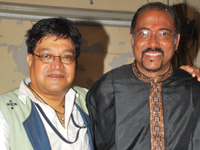
Feature Story
UNAIDS Head visits outreach programme for men who have sex with men in Mumbai
11 October 2009
11 October 2009 11 October 2009
Leading gay activist Ashok Row Kavi (left) with UNAIDS Executive Director Michel Sidibé
Credit: UNAIDS
During his visit to The Humsafar Trust site in Mumbai, Executive Director of UNAIDS Michel Sidibé shared with its founder, gay activist Mr Ashok Row Kavi, his vision of achieving universal access to HIV prevention, care and treatment in India by 2010.
Mr Sidibé was visiting Mumbai during his first visit to India as Executive Director of UNAIDS, he also congratulated The Trust on its contribution towards making the annulment of Section 377 of the Indian Penal Code a reality. The organization was part of the petition filed in a Delhi court against Section 377 which criminalized homosexual sex.
The Humsafar Trust is one of the first organizations in India to advocate for the rights of men who have sex with men. In 1990 Mr Row Kavi, along with a few other self-identified homosexual men, started a magazine called Bombay Dost (Bombay Friend) in an effort to create a “gay community”. They were deluged with letters from other men around the country, and even further, from Nepal, Pakistan, Afghanistan and Central Asia who were also in search of this community. Five years later, Mr Row Kavi moved into a government-provided abandoned building amid slums in Mumbai to offer health education and related services to men who have sex with men.
Because sex between men doesn’t lead to procreation, it is not taken seriously in India. At Humsafar, we never ask who you are; we’re only interested in whether you’re playing safe or not.
Mr Ashok Row Kavi, founder, The Humsafar Trust
Today, the Humsafar Trust continues to offer a drop-in centre, counselling services and a medical clinic that provides treatment for sexually transmitted diseases, facilities for HIV testing and referrals for HIV treatment. The Trust has been a frontrunner in challenging Section 377 and bringing about legal change to the way homosexuality is treated in India.
Explaining how the Humsafar Trust came to being, Mr Row Kavi, who also works as a consultant to UNAIDS, said “Because sex between men doesn’t lead to procreation, it is not taken seriously in India. At Humsafar, we never ask who you are; we’re only interested in whether you’re playing safe or not.”
The Humsafar Trust was joined by the Naz Foundation (India) Trust, a New Delhi-based non-governmental organization working on the AIDS response and sexual health in India since 1994, and the Lawyers Collective in filing a petition in the Delhi High Court against Section 377. Their efforts were rewarded when, on 2 July 2009, the court in a historical judgment declared 377 a violation of the rights to privacy, liberty, health and equality enshrined in the Constitution of India.
During his recent visit to New Delhi, Mr Sidibé congratulated these activists at an event in their honour. The court ruling strengthens the National AIDS Control Organisation’s (NACO) efforts to reach out to people at higher risk of HIV.
The UNAIDS Head said India’s decision on 377 is a huge victory because “removing laws that criminalize and discriminate herald a new framework and new commitment and a new movement to universal access to health and human rights”.
Statistics provided by NACO show that Section 377 encouraged people to remain hidden, making it difficult for them to access essential HIV, health and social services.
In a meeting with positive networks and civil society representatives, Mr Sidibé reassured those living with HIV that they were central to the UNAIDS mission. He said he looked forward to renewed energy in the AIDS response nationally and globally, despite the global financial and economic crisis.
Mr Sidibé’s visit to India will conclude on October 12.
UNAIDS Head visits outreach programme for men who
Press centre:
AIDS responses failing men who have sex with men and transgender populations
UNAIDS welcomes historic decision by Delhi High Court to annul the law that criminalizes adult homosexual relations
Feature stories:
Landmark Delhi High Court decision recognizes inappropriate criminalization as a barrier to health, human rights and dignity (07 July 2009)
Global initiative to stop the spread of HIV among men who have sex with men (24 July 2007)
External links:
Publications:
UNAIDS Outcome Framework: Universal Access for Men who have Sex with Men (pdf, 323 Kb.)
State of Homophobia (pdf, 250 Kb.)



